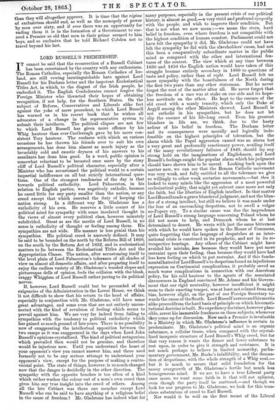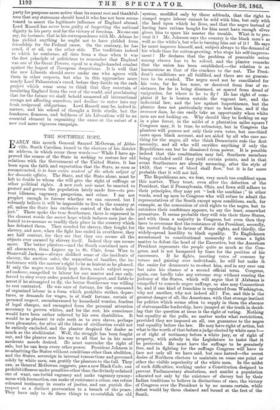LORD RUSSELL'S PREMIERSHIP.
IT cannot be said that the resurrection of a Russell Cabinet
has been entertained by the country with any enthusiasm. The Roman Catholics, especially the Roman Catholics of Ire- land, are still vowing inextinguishable hate against Lord -Russell for his Durham letter and the impotent Ecclesiastical Titles Act, in which, to the disgust of the Irish people, he embodied it. The English Confederates cannot forgive the Foreign Minister who thwarted their hopes of obtaining recognition, if not help, for the Southern States. On the subject of Reform, Conservatives and Liberals alike fret against the yoke of mere precedent, to which Lord Russell has warned 1113 in his recent book that he wishes all -advocates of a change in the representative system to submit their intellects. The political cliques are not few to which Lord Russell has given more offence by his Whig hauteur than ever Castlereagh gave by his more con- sistent Tory hauteur. The coolness with which on various occasions he has thrown his friends over to suit his own arrangements, has done him almost as much injury as the invariably cold and caustic dryness of his answers to his assailants has done him good. In a word, public opinion is somewhat reluctant to be breasted once more by the stony cliff of Lord Russell's political character, especially after a Minister who has accustomed the political world to a certain impartial indifference on all but strictly international ques- tions. One of the strongest tendencies of the day is that -towards political catholicity. Lord Palmerston, in his relation to English parties, was negatively catholic, because he cared little for any party smaller than the nation, or any creed except that which asserted the duty of keeping the nation strong. In a different way Mr. Gladstone has a catholicity of his own. He reserves a little corner of his political mind for sympathy with some insulated thought in -the views of almost every political class, however minutely 'subdivided. Great as are the merits of Lord Russell, in no sense is catholicity of thought or feeling among them. His sympathies are not wide. His manner is less genial than his sympathies. His political creed is narrowly defined. It may -be said to be bounded on the north by the Reform Bill of 1860, on the south by the Reform Act of 1832, and in ecclesiastical matters to lie between the Ecclesiastical Titles Act and the Appropriation Clause. The nation, after accustoming itself to the level plain of Lord Palmerston's tolerance of all shades of view on almost all domestic affairs, and after preparing itself to enjoy the endless variety of Mr. Gladstone's wooded slopes and picturesque dells of opinion, feels the collision with the bleak, craggy Whiggism of Lord Russell rather jarring to its political nerves.
If, however, Lord Russell could but be persuaded of the exigencies of the Administration in the Lower House, we think it not difficult to show that his return to the head of affairs, especially in conjunction with Mr. Gladstone, will have some great advantages, and some even that are not entirely uncon- nected with the kind of revulsion of feeling which seems to prevail against him. We are very far indeed from failing to sympathize with the tendency to political catholicity which has gained so much ground of late years. There is no possibility now of exaggerating the intellectual opposition between the two camps as it was exaggerated in the days when Lord John Russell's opinions crystallized. The kind of political antagonism -which prevailed then would not be genuine, and therefore would be injurious now. Until you understand the heart of
your opponent's view you cannot answer him, and there used formerly not to be any serious attempt to understand your opponent's view, except for the purpose of milking a contro- versial point. The state of things, however, is so much changed now that the danger is decidedly in the other direction. The sympathy with the opposite benches is too often of a kind which rather washes the colour out of a man's own creed than gives him any true insight into the creed of others. Among
all the late Cabinet was there one member except Lord -Russell who can be said to have anything of a religious belief in the cause of freedom ? Mr. Gladstone has indeed what for many purposes, especially in the present crisis of our political history, is almost as good,—a very vivid and profound sympathy with the people, and wish to improve their condition. But that is not what we now mean ;—we mean the stern, hard belief in freedom, even where freedom is not compatible with the highest condition of human comfort. Parliament could not have felt the sympathy it did, Mr. Gladstone could not have felt the sympathy he did with the slaveholders' cause, had not this been a comparatively subordinate matter in the public mind as compared with the other and international fea- tures of the contest. The view which at any time between 1830 and 1850 the English nation would have taken of this struggle became entirely secondary in 1860 to questions of taste and policy, rather than of right. Lord Russell felt no more sympathy with the boastfulness of the North during the first two years than any other statesman. But he never forgot the root of the matter after all. He never forgot that the freedom of a race was at stake on one side and its hope- less servitude on the other. He kept to the essence of the old creed with a manly tenacity, which only the Duke of Argyll among the other Ministers showed. Lord Russell is not catholic in his sympathies, but he does not let slip the essence of his life-long creed. Even his greatest blunders in life are, we think, due to the hasty ardour of his belief in freedom. The Durham letter and its consequences were morally and logically inde- fensible on the highest principles of toleration, but the alarm which the Papal aggression caused was an alarm lest a very great and profoundly reactionary power, availing itself of the many revolutionary failures of 1849, should lay any strong hold on the imaginations of Englishmen, and Lord Russell's feelings caught the popular alarm which his judgment should have shown him to be unreal. Looking back upon the matter now, we can see that the Roman Catholic movement was very weak, and fully entitled to all the tolerance we give so willingly to other weak sectarian movements,—but then it looked to many minds like the aggression of a most powerful ecclesiastical polity, that might yet subvert once more not only the faith, but the liberties of English intellect. In that matter LordRussellmaAle a grave blunder of judgment, and not the blun- der of a strong intellect, but still we believe it was made under the fear of an encroaching despotism, not to swell a vulgar no-Popery cry. To a similar cause was due the imprudence of Lord Russell's strong language concerning Poland whom he did not mean to help, and Denmark whom he at last determined to desert. He wrote with just the same bitterness with which he would have spoken in the House of Commons, quite forgetting that the language of despatches at an inter- national crisis is construed in its prophetic, and not in its re- trospective bearings. Any others of the Cabinet might have avoided his mistake, less because they would have put more restraint upon their feeling, than because they would have had less keen feeling on which to put restraint. And if this funda- mentalhatred of LordRussell's to despot ism found an injudicious expression on Continental complications, it probably saved us much worse complications in connection with our American policy, for his cold hauteur to the agents of the associated slaveowners in England convinced Mr. Adams and his Govern- ment that our rigid neutrality, however insufficient it might seem to their exacting temper, was at least not relaxed from any
bias, however slight, on the part of our Foreign Secretary to.. wards the cause of the South. Lord Russell's errors and his merits alike proceedfrom the hard basis of principle on which his consti- tutional doctrine isbuilt. No expediency doctrines, however plau- sible, arrest his inexorable frankness on these subjects, whenever they come up for discussion. Now such a Premier is invaluable in a Ministry in which Mr. Gladstone's influence is certain to predominate. Mr. Gladstone's political mind is an organic substance, a cellular tissue, when compared with the crystal- lized inorganic structure of Lord Russell's Whig creed, but for that very reason it wants the firmer and lower substance to rest upon, in order to give it strength and resistance. It is not much perhaps to believe in limited monarchy, parlia- mentary government, Mr. Burke's infallibility, and the damna-
tion of despotisms, with the whole strength of a Whig soul,—
but it is much to secure that solid foundation for the mossy overgrowth of Mr. Gladstone's fertile but much less
homogeneous mind. If we are to have a true Liberal party once more, we want some faith in it that will not splinter, even though the party itself be scattered,—and though we look for our progress to Mr. Gladstone, we look for this tena- cious substratum of creed to Earl Russell.
Nor would it be well on the first recast of the Liberal party for purposes more active than its recent rest and thankful- ness that any statesman should head it who has not been accus- tomed to assert the legitimate influence of England abroad. Lord Russell has never been guilty of forgetting the national dignity in his party zeal for the victory of freedom. No one can say, for instance, that in his correspondence with Mr. Adams he has yielded anything he ought not to have yielded from friendship for the Federal cause. On the contrary, he has erred, if at all, on the other side. The traditions indeed to which he conforms, all date from a time when it was the first principle of politicians to remember that England was one of the Great Powers, equal to a single-handed combat against the hugest of European despotisms. It is well that the new Liberals should serve under one who agrees with them in other respects, but who in this approaches more nearly Lord Palmerston's creed, before they decide on the rash project which some seem to think that they entertain of insulating England from the rest of the world, and proclaiming that for the future we shall behold unmoved all international wrongs not affecting ourselves, and decline to enter into any fresh reciprocal obligations. Lord Russell may be, indeed is, narrow, and his school Of thought a little sterile, but the frankness, firmness, and boldness of his Liberalism will be an essential element in organizing the cause at the outset of a new and more vigorous campaign.































 Previous page
Previous page